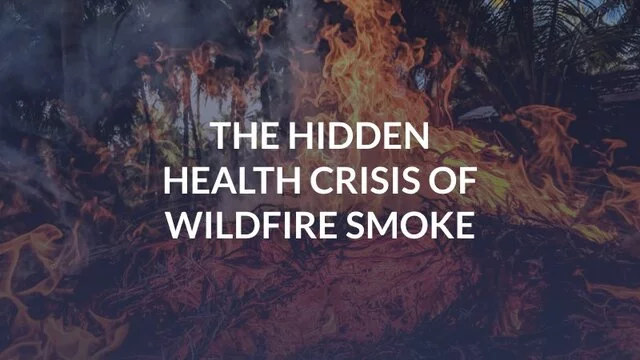
Wildfires are destructive forces that ravage homes and communities, but the harm doesn’t stop with burned landscapes. One of the most overlooked threats is the lingering health effects caused by wildfire smoke, which can affect people long after the flames are extinguished. As wildfire seasons intensify, the long-term health risks posed by smoke inhalation must be taken seriously, especially in litigation against those responsible for starting these devastating fires—like utility companies, railroads, and other negligent entities.
Wildfire Smoke: The Unseen Health Hazard
Wildfire smoke is a toxic cocktail of pollutants, including fine particulate matter (PM2.5), carbon monoxide, and volatile organic compounds (VOCs). PM2.5, in particular, can penetrate deep into the lungs, entering the bloodstream and causing a range of serious health problems. Short-term exposure can lead to breathing difficulties, eye irritation, and coughing, while long-term exposure increases the risk of chronic respiratory diseases, cardiovascular issues, and even premature death. The CDC warns that vulnerable populations like children, the elderly, and those with pre-existing conditions are especially at risk.
According to researchers at Yale Medicine, when the Air Quality Index (AQI) exceeds 201, "everyone should be concerned about health risks and limit outdoor physical activity as much as possible."
For context, during the 2023 Canadian wildfires, the PM2.5 AQI in New York City briefly surged above 400 in early June. Similarly, regions affected by the 2024 California wildfires have recorded daily averages exceeding 300, with areas closest to the fires seeing AQI levels over 500. The California Air Resources Board provides guidelines on safe activity levels at different AQI readings and warns that, at these elevated levels, all residents should avoid outdoor activity.
Long-Term Health Risks
The health consequences from wildfire smoke don’t end when the skies clear. Research has shown that repeated exposure to smoke can cause lasting damage to the respiratory and cardiovascular systems. Residents in fire-prone areas may experience years of health complications, including asthma, bronchitis, and heart disease. An added concern is that the long-term impact of repeated exposure is not well understood, highlighting the importance of ongoing health monitoring.
The Role of Utility Companies and Other Responsible Parties
Utility companies, whose equipment failures often spark wildfires, are often defendants in our cases where we fight for the rebuilding of our clients’ homes and communities. While property damage and economic loss claims are common, the long-term health impacts of smoke exposure deserve equal attention. Medical monitoring is essential to track the health of those exposed to wildfire smoke, ensuring that symptoms are detected early and treated properly. In addition to receiving funds for our clients to rebuild, we also advocate for defendants to pay for ongoing medical monitoring for those affected by severe smoke and poor air quality.
Why Medical Monitoring Is Crucial
Medical monitoring allows individuals exposed to harmful substances, like wildfire smoke, to receive regular health assessments over time. This is vital for detecting chronic illnesses that may not appear immediately but can develop years after exposure. Incorporating medical monitoring in wildfire litigation provides a framework for victims to safeguard their health, while also holding responsible parties accountable for the long-term consequences of their negligence.
As researchers and governmental organizations, like the CDC and EPA, warn, particle inhalation can be dangerous and impactful on your lungs and other organs. If you live in a wildfire-prone area and have children or have a pre-existing condition like asthma, it is important for you to know these risks and continuously monitor the impacts.
What Can You Do
As wildfire seasons grow more intense, the need for comprehensive legal strategies to address both immediate and long-term health impacts becomes urgent. Medical monitoring must be a standard part of post-wildfire recovery, especially when litigating against utility companies and other parties whose failures contribute to these disasters.
Our firm is committed to employing this approach in our wildfire cases and other environmental disasters that pose health risks to affected communities. In 2023, our firm brought the first medical-monitoring claim to address carcinogens and other dangerous toxins in wildfire smoke. We will continue prioritizing the health of our clients and ensure that justice goes beyond property repair, addressing the lasting and upending effects wildfire smoke takes on people’s lives.
If you have been affected by a wildfire (such as the recent Airport fire in Orange County), experienced property loss, or were harmed by subsequent poor air quality, you may have a legal claim depending on the cause of the fire. Contact the fire litigation attorneys at our firm to have your questions answered and to explore your legal options.
- Managing Partner
Gerald Singleton began his legal career as a trial attorney at Federal Defenders of San Diego in 2000, where he represented federal criminal defendants in the Southern District of California and before the Ninth Circuit Court of ...

